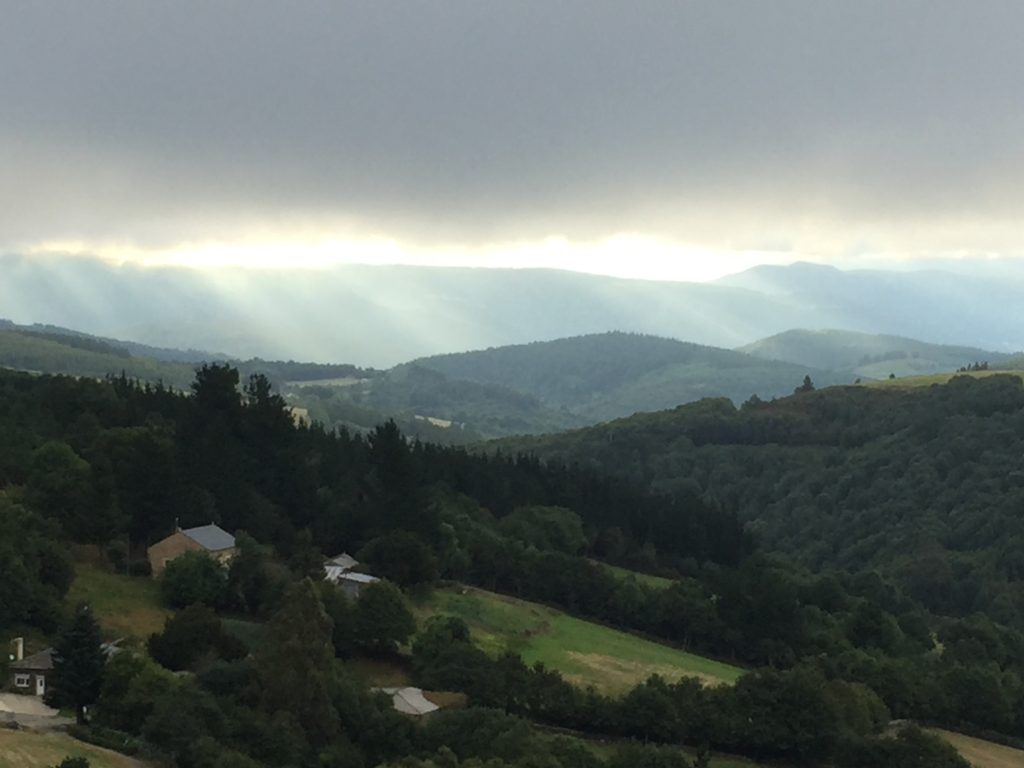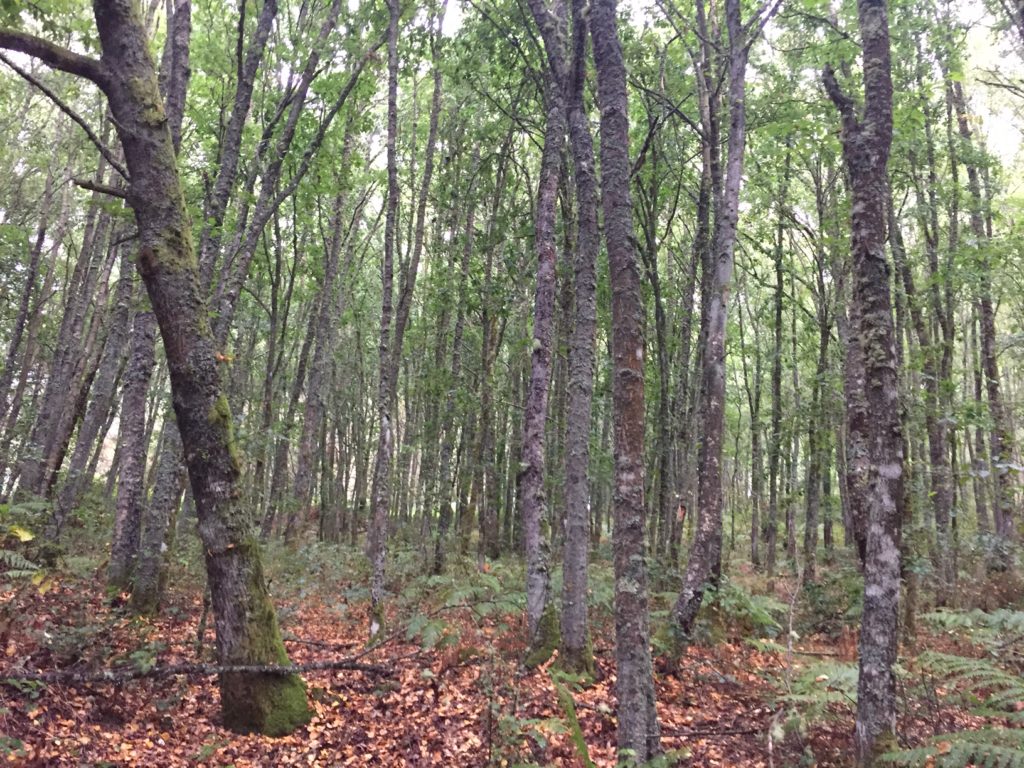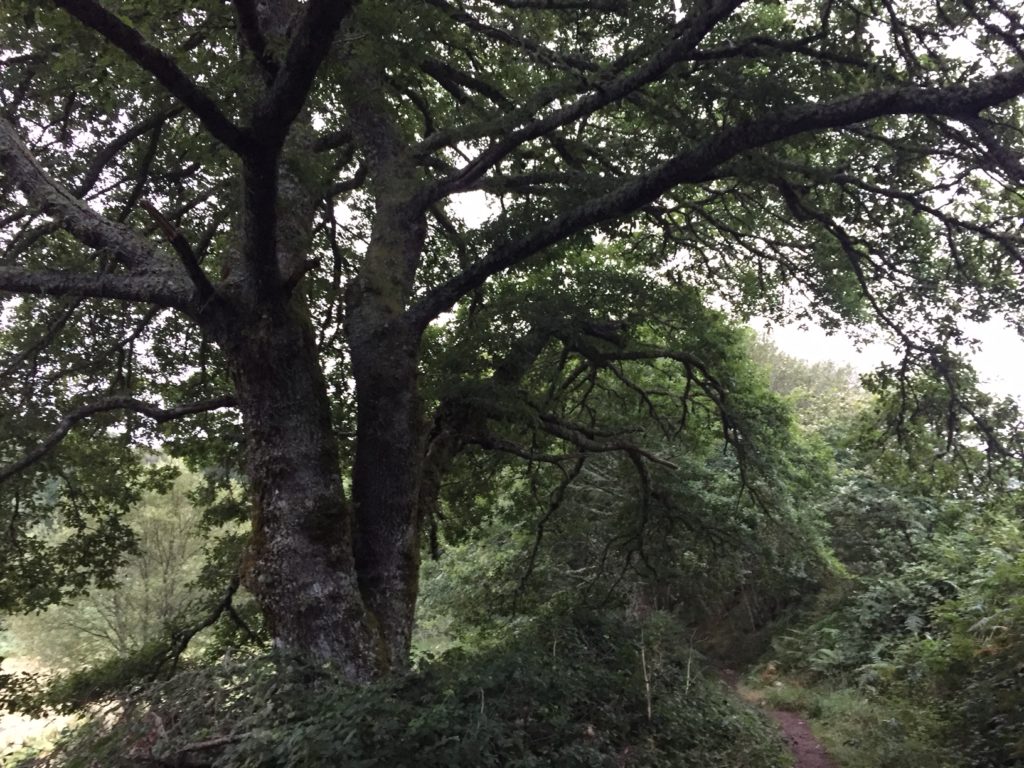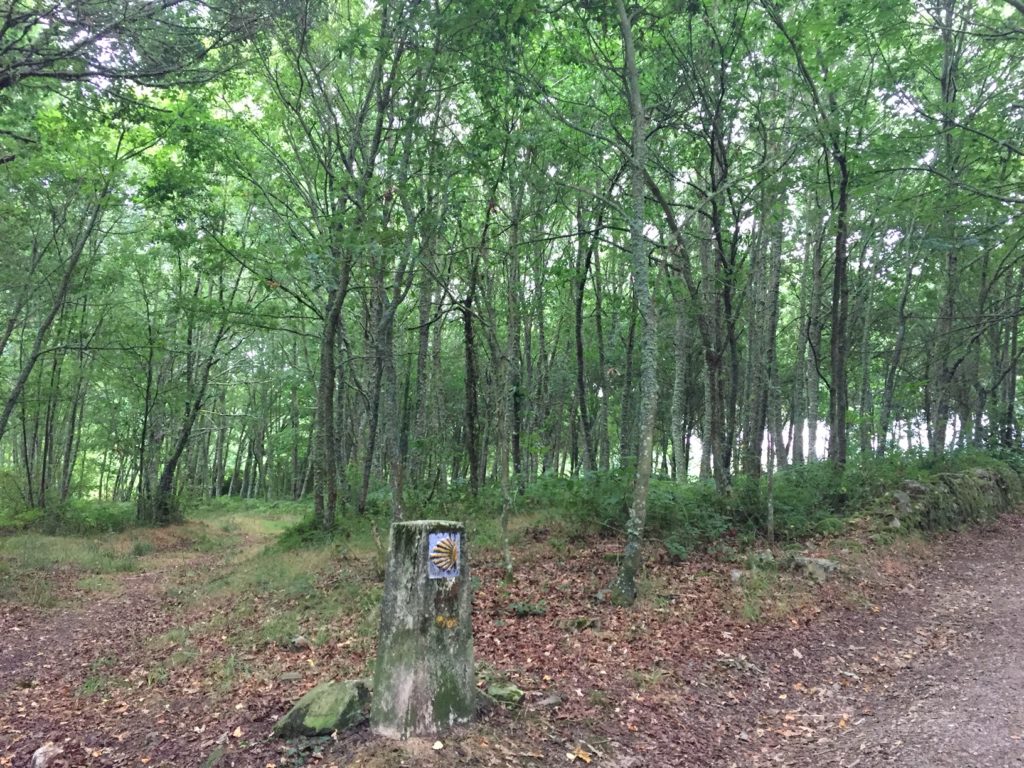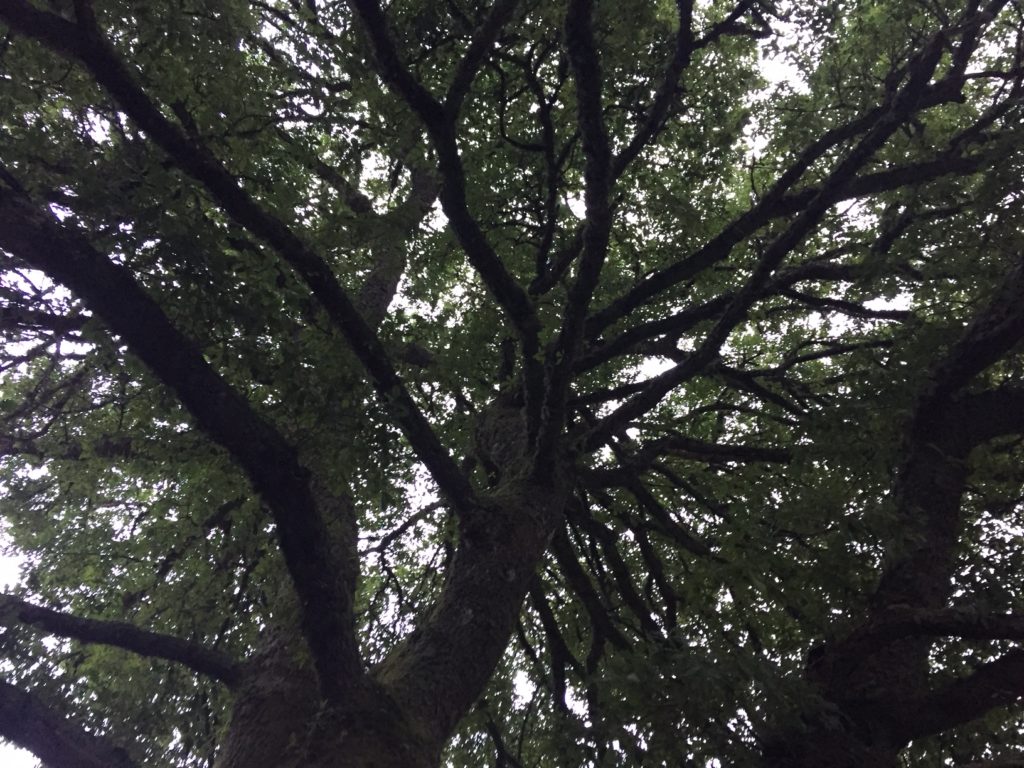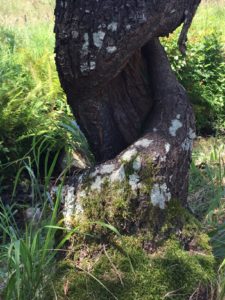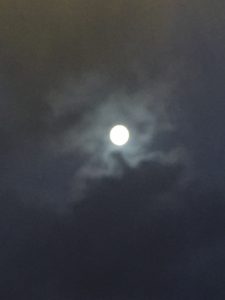home of the brave
Then, in that hour of deliverance, my heart spoke. Does not such a country, and such defenders of their country, deserve a song?
— Francis Scott Key
A day rich in weather…fog, mist, water in the air and underfoot on the trail. All day, I walked writing a song. Svend should have seen me go under my hood, a student of my previous day. By the time I reached A Fonsagrada and Podrón, the song was leading me.
Joanna had told me yesterday that she envied my ability to change my life. She said it was not so easy in Poland; many choices, like returning to college, a career change, were subject to approval by governmental agencies. I had no idea. She said she was only teaching now by a miracle, a new private school that worked with her on taking certification courses. If not for this unique opportunity, she would still be in her old, miserable job. “Many people in Eastern Europe see America as a land of this opportunity – to become who you wish to be.” Even if I didn’t always behave like an American, I clearly saw that I thought like an American – entitled to be free.
Free to do whatever I damn well please. I gave 17-year-old me a stern glance. Released is not free; it is unmoored, unchained. Unless I chose to rise, I would just remain forever adrift. Homeless.
* * * * * * * * * * * * * * * * *
As I neared the albergue, a cab pulled up in front of it, and three peregrinos hopped out, pulling backpacks from the trunk and hustling inside. I quickened my pace and stepped in at the door behind them.
All three were haranguing the hospitalera, who was becoming overwhelmed and frustrated. She saw me at the door, and I approached her desk, saying quietly, “Buenos dias; cama por uno persona, por favor?”
“Uno persona?” she confirmed. I nodded, and she waved me in, past the arguing cab riders, who threw a new fit as I followed her up the stairs. Apparently, they didn’t know that pilgrims who arrived by foot always had precedence over pilgrims arriving by vehicle, in the municipal albergues; no reservations accepted.
I was escorted to the last bed in a room for four people. And who did I find in the other three bunks? Cordula, Christoph, and Joanna. Surprise and delight filled the room, and filled me. I had arrived just in time to go to mass, where the priest would give a Pilgrim’s Blessing that night.
I sat next to Christoph as the service began. The mass was beautiful, simple. At the end, the priest called all peregrinos to join him at the front of the church. We stood before the small congregation, while he blessed us all – the jerks and the arrogant, the cab riders and the song writers, the beautiful souls and the wise map makers and the ones who would be monks. The psalm the priest chose for us he called Pilgrim’s Psalm, in fact the 23rd, which included images of being led beside still waters, and guided along the right path. “You have prepared a banquet for me in the sight of my foes. My head you have anointed with oil; my cup is overflowing. Surely goodness and mercy shall follow me all the days of my life.”
I thought of the pilgrim’s dinner before the Hospitales Route, our cups overflowing with wine, a banquet prepared without my having to plan a menu or lift a finger, everyone invited. I knew that the anointing with oil was an historic Jewish rite denoting a chosen king, interpreted as a personal blessing. I remembered my blessing on the mountaintop. Goodness and Mercy were doing their best to follow me, but I was ducking them at every opportunity.
I tuned back in as the priest gave us his Pilgrim’s Blessing: “…Help these pilgrims on their way to Compostela. Guide their footsteps with your kindness. May your shadow protect them during the day and the light of your eyes shine on them by night, so that they can happily stand before the tomb of the Apostle Santiago.” My printed translation of the blessing began with the typo “Lord Good.”
Lord Good. It touched my heart as we stood, pilgrims all together, for endless photos, the priest happy to take a picture for each peregrino with their own cell phone camera. Nonetheless, I did not hand my phone forward. I held the moment of blessing very close, trying hard to remember it. I didn’t want a picture. I wanted this blessing to leave an image of itself within me, forever. Plus, having my picture taken annoyed me, and I just wanted that part over. I was tough to bless.
Even so, afterward, an elderly woman with a palsied face reached out to me. A member of the local church, she had stayed, sitting alone in the pews while we had our pictures taken. Why she reached for me specifically, I could not say. She took my hand, then my face, and kissed both cheeks, saying gently, “Buen Camino,” then kissed me on the forehead, one last time. As she walked out, she turned and blew kisses to me, out of sheer love.
In my case, maybe for luck, as well. “Good Way,” she’d blessed me. Basic Goodness: I wondered if
I could actually learn that meaning of Life this time. Apparently, I needed a lot of repetition for the blessing to stick with me.
Christoph had given me excellent words of wisdom about “my American” dilemma. We agreed that we detected a certain loneliness in Ben, that he seemed desperate at times, and quite sad; being American just added a layer of awkwardness and blundering. “I think he is doing the best he can,” Christoph had advised me, kindly.
* * * * * * * * * * * * * * * * *
I walked arm in arm with Joanna back to the albergue at the end of the evening. As we came upstairs, I saw Ben taking off his boots. “Hey,” I said softly, without hostility, giving a little chin nod, the quintessential American greeting. I tried hard to put that light into my eyes, to shine some kindness his way, here in the night. He was caught off guard. Close enough, I thought, walking on to my room.
Joanna was now stretched out on her bunk. “I wrote that song, about your sad burned trees around the long lake,” I told her. “Do you want to hear it?” She was all ears. And adorable smile.
in my mind today
I must find another way
where the trees that were on fire
bloom with butterflies and briarwhere the walking is the day
where the journey is the way you walk iten mi corazon, me das El Camino, me das El Camino
en mi corazon, me das El Camino, me das El Caminoon my wall there hangs a shell
reminding me to walk it well
unexpected twists and turns
the mint is sweet, the nettle burnsbetween the mountains and the sea
every shrine and every chapel a cathedralen mi corazon, me das El Camino, me das El Camino
en mi corazon, me das El Camino, me das El Camino— “El Camino”
“Oh sing it again – I want to record it!” Joanna cried, pulling out her phone. I sang it again for her, my enthusiastic audience.
“Do you want to hear another?” I asked, laughing.
“Oh yes!” she said.
From the next room, a loud rustling of unpacking could be heard, interrupting our recording session. “Shhh,” I heard, “Barbara is singing. Be quiet.” I looked out. It was Mauro in his bunk. He told me he loved my voice, and to please keep singing. I think I sang him to sleep; he was feeling sick, so maybe in this way I passed my blessing on.
A Fonsagrada – “To The Sacred Fountain.” The legend we heard was that Saint Francis, himself on pilgrimage to Santiago, had gotten sick and stopped there, cared for by the locals until he recovered; in return, he had blessed their fountain, and it ran white with rich milk to feed them. A banquet, their cups overflowing.
* * * * * * * * * * * * * * * * *
“Oh no! I missed it!” was Christoph’s response when Joanna later told him I sang for her.
“Don’t worry,” I told him, looking up from my notebook atop my upper bunk perch, “we can sing again; singing is fun.”
And I was dumbstruck to hear myself in that moment – singing is fun. Why had I never said this before? Performance anxiety, I supposed. A hundred small disappointments, I lamented. Singing was my mother’s claim to fame, not mine, I backpedaled. Well, not any more. Listening to myself along the trail, I had heard an echo of my mother’s rich alto voice rising in my 51-year-old throat. Her unintended gift to me.
I looked out the small window at the stars, and was thankful for the gift of singing: music, welling up within me like a fountain, everywhere I went. The perfect instrument for my poetry. The Pilgrim’s Prayer had concluded with, “May we joyfully end the way that we are trustfully doing now.”
* * * * * * * * * * * * * * * * *
As I walked along, late in the morning, I heard a familiar voice behind me: “Hola, Chicka!” I turned to see Francesca striding down the hill behind me, which quickly rose again in a new hill, the rolling stroll we had entered now in Galicia. I ran back down and met her in the hollow, and we hugged tightly.
“I thought you were going to walk the Norte!”
“Right, that was my plan, but then I so wanted to do the Primitivo, you know?” Francesca had been walking long days, over 30 and 40 kilometers daily, trying to find beds in the limited number of albergues on the Primitivo. Still, we were so happy to see each other, to walk together again for a few hours, to hear each other’s stories. She was delighted to hear I was writing songs; I had missed her London sass.
As we packed up from our lunch break, we were joined by a most unlikely third wheel: Ben. I introduced him to Francesca, who eyed him suspiciously upon hearing that he was an American. She had just told me, “Your countrymen are not doing much to disavow the stereotypes of Americans abroad. In fact, you’re the only one I like.”
We set off down the path together. Because I had been kinder to him in cafes and albergues, Ben now bravely struck up a more real conversation. “I heard you singing the other day; that was really good. Is that what you do? Are you a singer?”
“You mean on stage? I have, in the past.” I looked over at him. “But it doesn’t pay anything, unless you give up your whole life to travel around, go on tour.”
“You don’t do that?” he asked.
“No, I have a family, so I found a day job instead.”
“So what work do you do?”
I remembered answering this question when I took my oldest daughter to her college Freshman Orientation. We were sitting at a table of other parents, and I remembered their faces, and my daughter leaning over to me after I answered: “Way to kill the conversation, Mom.” It was true; the parents didn’t talk to us after I told them.
“Did. I used to work with homeless people. We had a community resource center where people could come to eat, take showers, get their mail, lots of support services.”
Ben didn’t bat an eye. “But you don’t do that any more?”
“Nope. I decided to do this. So I quit my job, sold my house, and bought a plane ticket to Spain.”
Now Ben batted an eye – both of them, blinking in shocked surprise. “You sold your house? I mean, most people in America, they wouldn’t….”
“Yeah, I know. I’m a bad American. I gave up everything I owned. Well, except the jeep.”
“Well of course not the jeep,” Francesca chimed in.
“Right,” I agreed.
“Wow,” Ben replied, clearly considering this new information. “So you sold your house – but you have a family?”
“Yeah, but they’re grown people. They have homes of their own, now. Except my youngest son. And he’s in high school; he’s living with his father.”
Ben was thoughtful for a moment. “I can’t imagine doing that. My wife and daughter wouldn’t go for that.”
“Most Americans wouldn’t go for that,” I agreed.
He was a dad; I smiled. Ben talked about living in San Diego, the cultural pressures to live in the right neighborhood, send his daughter to the right school, those dinner party conversations about the work you do. He was feeling particularly boxed in by work. Francesca and I listened.
Ben asked about the work of the resource center. I told him how we ran it, the programs, having to ask people to leave for the day if they were intoxicated or behaving in ways that made others feel unsafe.
Ben pounced on the idea of homeless people being alcoholics. Francesca immediately explained that didn’t apply to everyone.
“So many issues contribute to homelessness,” she countered. “You don’t become homeless just because you drink, or you lose your job. You become homeless if you lose your job AND have no money in savings AND have no network of people to help you until you find another job.”
I agreed. “Homelessness is a house of cards. It’s not very solid to begin with, and then any combination of crises brings it tumbling down.”
Ben asked lots of questions about homelessness, and seemed to be learning. I taught him that he can’t say “those people” about anyone unless he wants to engage in unhelpful stereotyping. He got it, that it was a phrase of judgment and distancing, a tool for alienation, and even hate.
Whoever teaches learns in the act of teaching,
and whoever learns teaches in the act of learning.— Paulo Freire
Francesca and I got a glimpse of the impact when he casually mentioned having served in the Israeli Army, when he was younger and living in Israel. It didn’t matter in that moment what our politics were: we exchanged a glance, imagining this simple guy not more than a boy, carrying a gun, facing war with the Palestinians; this Jewish man trying so hard to fit in and gain acceptance in his San Diego neighborhood, in sunny blond Southern California. America the Beautiful.
oh say, does that star spangled banner yet wave
o’er the land of the free
and the home of the brave?— Francis Scott Key, “The Star Spangled Banner”
Just before we parted ways, feeling comfortable and trying to be funny, Ben made a comment on something Francesca and I had just said, tagging in with, “Women!” And I did not eviscerate the man with my titanium camping spork, nor did I allow Francesca to gouge his eyes out.
“Ah – ah – ‘Those People!'” I reminded him.
“Hey, you’re right!” he responded in total surprise. And to my total surprise, we all got to laugh together, before waving goodbye.
As I walked on, I remembered a quotation I had once written on the whiteboard for ArtSpeak: “Every blade of grass has an angel that bends over it and whispers, ‘grow, grow.'” It was from the Talmud, one of the beautiful, poetic holy scriptures of Judaism.
Before I reached the albergue, I had written another song. Mostly, it was about my kids, about what it felt like to be a parent; it’s also a reminder to myself, to look past people’s fears and find that sacred spark of light shining in every person, sometimes tucked away into a hidden, secret place, watched over by the whispering angels of Lord Good, and the Tree of Life to which we all belong.
every blade of grass
has its angel bending low
whispering so soft and low
grow…every falling star
is a dream I dreamed of you
how I wished you would come true
glow…Life takes hold and Life moves on
learns to walk and learns to run
but I’m still whispering to you
grow…shoot your arrows to the sky
spread your wings and learn to fly
climb up strong and climb up high
grow…you’re the sun and you’re the moon
all my harmonies in tune
starlight woven on a loom
you glow…Life takes hold and Life moves on
learns to walk and learns to run
I’m always whispering to you
swim your waters that are blue
build the fire that is you —your life’s a dream that has come true
and you glow— “Every Blade of Grass”
